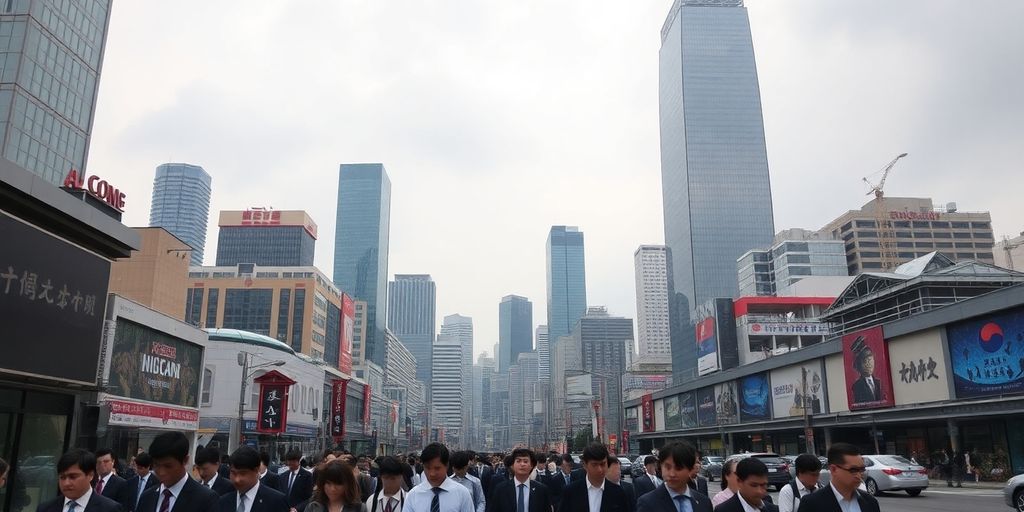News
South Korea’s Political Turmoil Impacts Stock Market

South Korea is currently facing significant political turmoil following President Yoon Suk Yeol’s controversial declaration of martial law, which he imposed and lifted within hours. This rapid shift has sent shockwaves through the financial markets, leading to a notable decline in stock prices and raising concerns about the country’s economic stability.
Key Takeaways
- President Yoon Suk Yeol declared martial law, which was quickly overturned by parliament.
- The Kospi index fell 1.44%, while the Kosdaq dropped 1.98% amid market volatility.
- The Bank of Korea announced measures to stabilize the financial markets, including boosting liquidity.
- Opposition parties are moving to impeach President Yoon, further escalating political tensions.
Overview Of The Situation
On December 3, 2024, President Yoon Suk Yeol declared martial law in response to what he described as threats from opposition parties. This marked the first such declaration in South Korea since 1979. However, the move was met with immediate backlash, leading to a parliamentary vote that unanimously overturned the decree just hours later. The swift reversal has left investors and analysts questioning the stability of the current administration and the future of South Korea’s political landscape.
Market Reactions
The financial markets reacted sharply to the political upheaval. The Kospi index, which tracks the performance of the South Korean stock market, fell by 1.44% to close at 2,464. The Kosdaq, which focuses on technology and growth stocks, experienced an even steeper decline of 1.98%, ending at 677.15. Notably, major companies such as Samsung Electronics and Hyundai Motor saw their stock prices drop significantly, reflecting the broader market sentiment.
- Samsung Electronics: -1%
- LG Energy Solution: -2.8%
- Hyundai Motor: -2.4%
Government Response
In light of the market turmoil, the Bank of Korea convened an emergency meeting to address the situation. The central bank announced plans to enhance short-term liquidity and stabilize the foreign exchange market. Reports indicated that the financial regulator was prepared to deploy a stock market stabilization fund worth 10 trillion won (approximately $7.07 billion) to calm investor fears.
Political Implications
The political fallout from the martial law declaration is significant. A coalition of opposition lawmakers has initiated impeachment proceedings against President Yoon, further complicating the political landscape. Analysts suggest that the ongoing instability will erode investor confidence in South Korea, potentially leading to long-term economic repercussions.
Conclusion
The recent events in South Korea highlight the delicate balance between political authority and democratic processes. As the situation unfolds, both domestic and international investors will be closely monitoring developments, particularly regarding the stability of the Yoon administration and its impact on the South Korean economy. The swift actions taken by the government and the central bank will be crucial in restoring confidence in the markets and ensuring economic stability in the face of political uncertainty.
Sources
- Stock Chart Icon, CNBC.
- South Korea’s brief martial-law showdown: What U.S. investors need to know – MarketWatch, MarketWatch.
- Korean stocks trim declines after president lifts martial-law order – MarketWatch, MarketWatch.
- Euro gains as crisis comes to a head; South Korean won cuts losses as martial law lifted | Reuters, Reuters.
- Morning Bid: South Korea’s martial law confusion deepens caution | Reuters, Reuters.
-

 Press Release4 days ago
Press Release4 days agoClinical Trials Market Set for Robust Growth, Driven by Drug Development Surge and Digital Innovation
-

 Press Release6 days ago
Press Release6 days agoBellarium ($BEL) Price Prediction: Could It Hit $5 by 2026?
-

 Press Release4 days ago
Press Release4 days agoIndustrial Boiler Market Expected to Surpass USD 24.4 Billion by 2035 Amid Growing Demand for Energy Efficiency and Industrialization
-

 Business5 days ago
Business5 days agoHow Managed IT Solutions Help Small Teams Compete at Enterprise Scale
-

 Press Release4 days ago
Press Release4 days agoPreventive Vaccines Market to Witness Strong Growth by 2035
-

 Press Release4 days ago
Press Release4 days agoGreen Bio Chemicals Market Poised for Sustainable Growth amidst Global Shift to Eco-Friendly Alternatives by 2035
-

 Press Release4 days ago
Press Release4 days agoFill-Finish Pharmaceutical Contract Manufacturing Market Expected to Flourish Amid Biopharmaceutical Boom and Global Outsourcing Trend by 2035
-

 Press Release4 days ago
Press Release4 days agoPet Food Nutraceutical Market Set for Robust Expansion Amid Rising Demand for Pet Wellness by 2035










